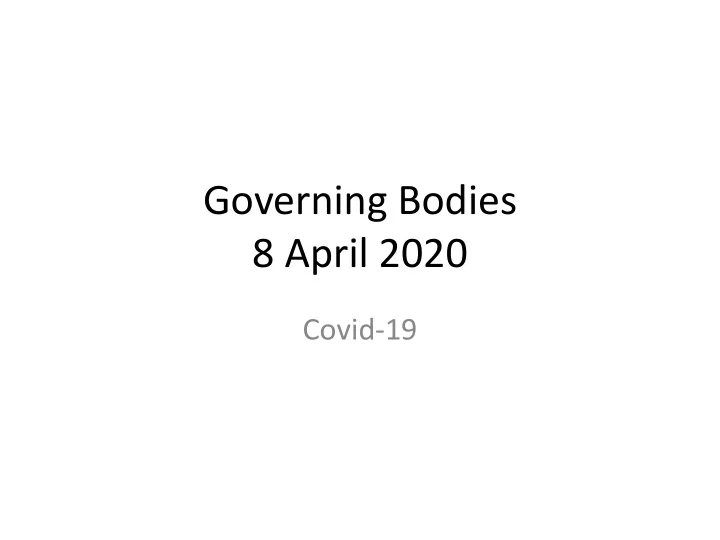

Governing Bodies 8 April 2020 Covid-19
Current Position (at 6 April 2020) • Kirklees confirmed cases: 198 • CHFT reporting 32 deaths, MYHT 57 • Number of cases based on hospital testing – actual number of cases will be much higher • 4 messages at ICS level: – Increasing critical care capacity – Safe discharge of 1000s of patients – Joined up support for shielded patients – Managing business continuity
Governance & Co-ordination Regional Arrangements [West Y&H Covid 19 Strategic Health Co-ordination Group West Yorkshire Strategic Command Group] Calderdale Wakefield Place Place Arrangements Arrangements Organisational Arrangements [Gold/Silver/Operational]
Increasing Critical Care Capacity • Harrogate Nightingale Hospital – up to 500 beds • Opening date to be confirmed, being overseen by LTHT with Executive team convened from across the region • CHFT and MYHT are both opening additional capacity – this flexes as required and is influenced by equipment availability (ventilators)
Releasing Bed Capacity • Significant push to discharge patients from hospital beds • Supported by national suspension of Continuing Healthcare Assessments. • Postponing of non-urgent elective surgery • Scoping requirements for additional community based beds • National position on what community providers should stop doing in order to support increased discharge
Support for Shielded Patients • System in place to support with food, medicines, social needs – rapidly evolving as national guidance is issued and central elements of the infrastructure are deployed • Fits with the Councils Place Based Support Hub – Partnership Spectrum of Support (see later slide) • c1,000 patients registered on national portal as at 01/04 – all those asking for help contacted by phone • First emergency food deliveries made locally on 30/3 • National food deliveries have also started direct to patients doors • Risks re capacity within community pharmacy to deliver medicines • Working to streamline the process which has been put in place in just over a week and to ensure it is sustainable
Primary Care Response • Our practices operating in line with national instructions have made radical changes: – Total triage model – Many appointments are now done by phone, email or online – Face to face and home visits still available for those who need them – Patients asked not to visit the practice without a confirmed appointment
Primary Care Response • 2 Primary Care Covid-19 Assessment Centres: – NK – 1 April 2020 – GH – 6 April 2020 • Service for ambulant patients with Covid symptoms, subject to specific criteria • Covid Home Treatment Service in development • GP practices open on Good Friday and Easter Monday
Managing CCG Business • NUH not being opened unless for specific issues • Doing as much as we can to support mutual aid – internally and externally • All meetings taking place virtually • Review of existing programmes to determine which can be paused and capacity re- deployed elsewhere
Managing CCG Business • Processes adapted to reflect pace of change and need for quick decisions: – Assurance Process for Rapid Service Change in response to Covid-19 – Financial decision making – Decision log with reporting into next available Committee – Primary Care Commissioning Committees – Emergency Decision Making meetings now in place
Current Issues • PPE Distribution, in particular to services other than acute hospitals • Introduction of staff testing • Mobilisation of CoHoRT • Confirmation of increased community bed base
In three weeks, our system has: • Radically changed the model of primary care • Mobilised two Covid-19 Assessment Centres • Maximised the discharge of patients from hospital • Expanded critical care capacity in our hospitals • Provided support to our most vulnerable residents • Demonstrated new ways of working by being flexible, adaptable and embracing digital solutions
Recommend
More recommend